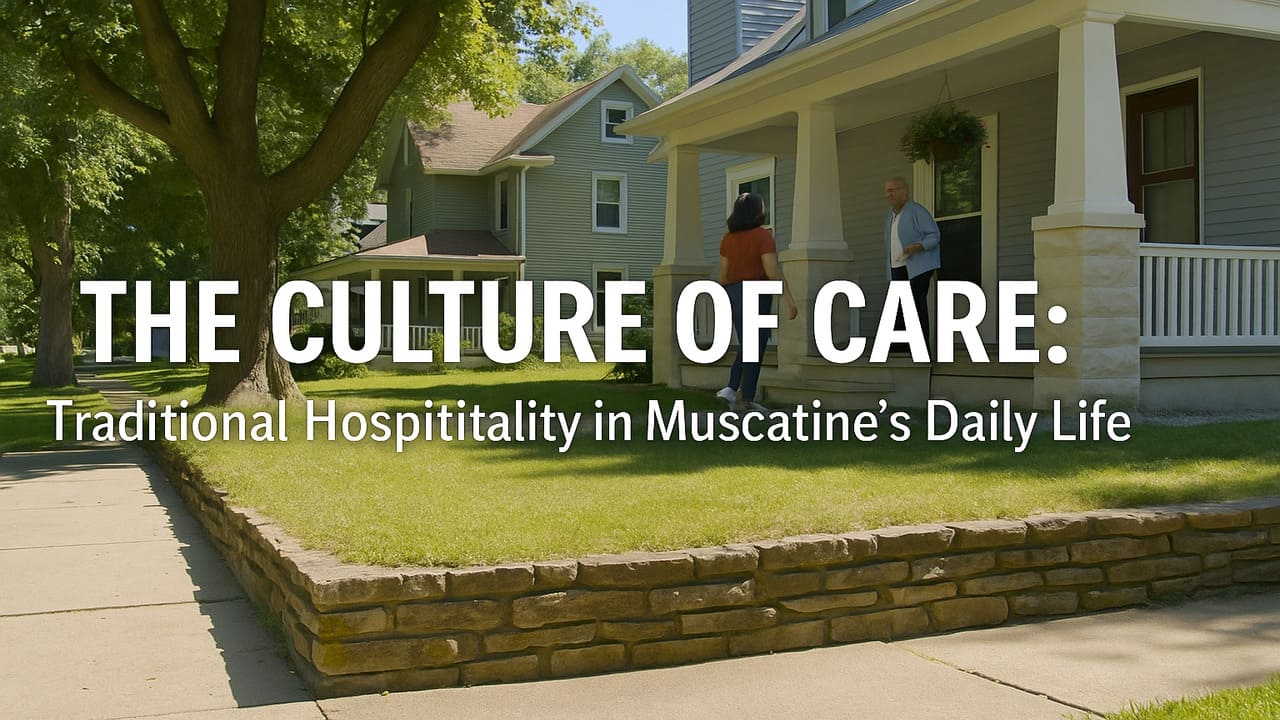
Meet Muscatine – Tucked alongside the Mississippi River, Muscatine, Iowa, is more than just a picturesque small town it’s a place where kindness, connection, and community are part of daily life. While many cities across the U.S. move at a rapid, impersonal pace, Muscatine still treasures an old-fashioned concept The Culture of Care. This tradition isn’t merely about polite manners, but a way of living rooted in hospitality, neighborliness, and shared values.
Muscatine’s culture of care has its origins in the region’s farming and riverfront heritage. Generations of residents have built their lives on cooperation whether it was borrowing tools from a neighbor, bringing food to grieving families, or organizing church suppers that united entire blocks.
Even today, you can still find porch lights left on for expected guests, handwritten notes on front doors, and neighbors mowing each other’s lawns just to help. It’s these small, consistent acts of generosity that reflect a deeper cultural code taking care of one another without expecting anything in return.
In Muscatine, hospitality isn’t limited to family gatherings or special occasions it extends into public life. Local businesses greet customers by name. Restaurants like those along Second Street remember regulars’ orders. Even city-wide events like Heritage Days or the Holiday Stroll are filled with volunteers eager to make guests feel welcome.
There’s a shared belief in making people feel like they belong, whether they’ve lived in town their whole life or just arrived yesterday. This inclusive attitude is part of what makes Muscatine’s version of hospitality feel different it’s authentic, warm, and woven into every aspect of daily life.
Also Read : Everyday Heroes Speak Out in ‘Voices of Inspiration’
Churches and community centers are central to upholding Muscatine’s caring culture. Sunday services often end with potlucks, while community halls host quilting circles, food drives, and local fundraisers. These gatherings aren’t just social they’re acts of care that keep the town close-knit.
Faith-based traditions, in particular, emphasize service to others. Many families raise children with the expectation to “check on your neighbors,” especially the elderly or those living alone. It’s not unusual for someone to stop by unannounced, just to deliver fresh-baked cookies or share garden vegetables. These gestures, though simple, carry the weight of tradition.
As Muscatine grows and diversifies, the town’s culture of care adapts welcoming newcomers while still holding tight to its foundational values. New residents often comment on how quickly they feel at home. “I moved here and within a week, my neighbor invited me over for dinner,” said one recent transplant. “That doesn’t happen in most places.”
At the same time, long-time residents are careful to teach younger generations about the town’s customs. Schools host intergenerational projects. Libraries organize oral history events. All of it helps ensure that the spirit of Muscatine’s hospitality lives on.
Also Read : Muscatine Skate Park: Where Teen Energy Meets Community Action
The culture of care in Muscatine isn’t just a nice sentiment it’s part of the town’s identity. It influences how people vote, how schools are run, and how local problems are addressed. When floodwaters threaten riverside homes, neighbors form sandbag chains within hours. When someone falls ill, a benefit dinner is organized without hesitation.
This mindset has become a quiet but powerful social fabric, where resilience is built not just on infrastructure, but on people helping people
In a time when digital interaction often replaces face-to-face connection, Muscatine’s commitment to traditional hospitality serves as a reminder: care is not outdated. It’s what sustains communities, especially in uncertain times.
As the world moves faster and further apart, towns like Muscatine show us that slowing down, saying hello, and lending a hand still matter and always will.